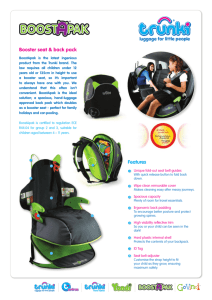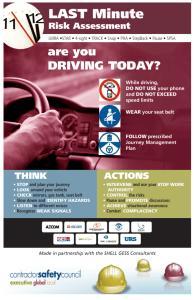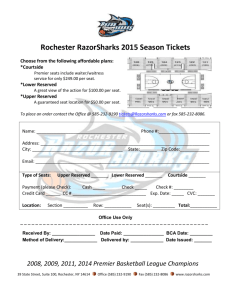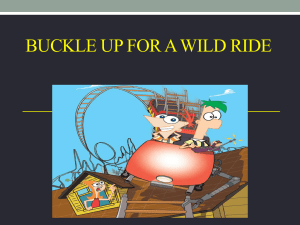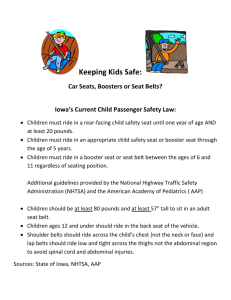Child Safety Seats Powerpoint Presentation
advertisement
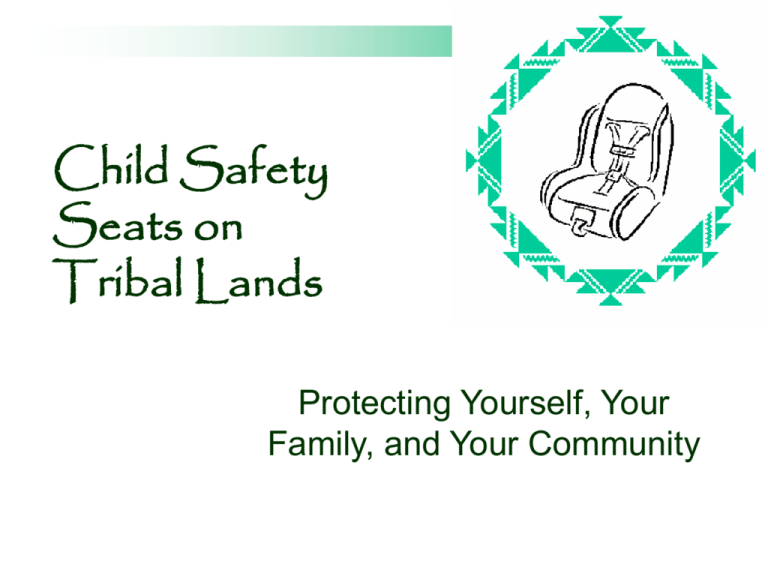
Child Safety Seats on Tribal Lands Protecting Yourself, Your Family, and Your Community Why use Car Seats? Motor Vehicle Accidents are the LEADING CAUSE OF DEATHS from unintentional injuries for Native Americans… 1 … and more Natives die from motor vehicle accidents than poisonings, falls, or suffocations COMBINED 1 [1] CDC Web-based Injury Statistics Query and Reporting System (WISQARS). http://www.cdc.gov/ncipc/wisqars/. Aggregated 1999 – 2005 data. Accessed online 4/12/2008. What Is the Best Car Seat or Restraint To Use? The one that: Fits your child Fits your vehicle You will use correctly every time 4 Steps for Kids 1. Rear-facing 2. Forward-facing 3. Booster seats 4. Adult seat belts Step 1: Rear-facing Infant Seat ■ They have a 5-pt. or 3-pt. harness ■ Keep infants rearfacing until a minimum of age 1 and at least 20 pounds. Rear-Facing Infant Car Seats Why Infants Should Travel Rear-facing… Increased crash protection Spreads crash force along the entire head, neck, and back Protects head, neck, and spinal cord Car Seat absorbs forces of the crash Step 1 & 2: Rear-Facing / Forward-Facing Convertible ■ Rear and Forward facing ■ 5-point harness ■ Reclined for rear-facing and upright for forward-facing ■ Harness slots at or below the shoulders for rear-facing and at or above for forward-facing ■ Can be used for larger infants less than one year, and 20-35 pounds Installation: Rear -Facing Never put in front of an active airbag Correct Belt Path/or LATCH Recline angle (30-45 degrees) Tight belt Step 2: Forward-Facing Child Restraints Convertible and Forward-facing only 5-point harness or Tray-shield Must be: One year AND 20 pounds Installation: Forward -Facing ■Back and bottom flat ■Harness at or above shoulders ■Snug ■Retainer clip at armpit level ■Pinch test Step 3: Booster Seats Booster seats are for children from 40 to 80 pounds Lap/shoulder belt only Head restraint Shoulder belt positioners Use the 5 Step Test High back Belt-positioning Backless Booster Boosters: The 5-Step Test 1. Does the child sit all the way back against the auto seat? 2. Do the child's knees bend comfortably at the edge of the auto seat? 3. Does the belt cross the shoulder between the neck and arm? 4. Is the lap belt as low as possible, touching the thighs? 5. Can the child stay seated like this for the whole trip? If “No” A booster seat is needed If “Yes” Ready for the vehicle seat belt Step 4: Seat Belts Vehicle seat belts are made for adults 4’9” or taller Most children reach this height at 8 years old and 80 pounds All children under the age of 13 should still sit in the back seat Parts and Functions Shell/frame Padding/cover Retainer Clip Buckle Recline adjustment Harness Slots Harness Straps Belt path Harness Adjustment Splitter Plate Splitter plate is located on the back of the car seat (tightens the harness straps) When moving to a different harness slot… unhook the harness straps from the splitter plate 2. thread straps through the desired slot and re-attach. 1. Locking Clip Locking clip is placed within 1 inch of a seat belt so that its retractor will keep the belt and car seat locked in place in event of a crash. Usually stored on the back or bottom side of the car seat Belt Path Belt path is indicated by labels on the side of the car seat. Convertible seats have two belt paths: 1) One if car seat is facing forward 2) Another if facing backward Be sure to use the correct belt path for the direction your child’s car seat is facing. Lower Anchors and Tethers for Children (LATCH) ■ Tether anchors the top ■ Lower attachments anchor the bottom ■ Used in place of a seat belt Parts and Functions for Infant Seats Harness adjust bar Labels Level indicator Instructions location Recline adjustment Recline adjustment is located on the bottom of infant carriers Used to adjust the tilt of the carrier to the safest angle of 30° to 45° Always register your seat! Registration Card HTTP://www.nhtsa.gov Items can be recalled if they do not function properly or cause danger to your child. Love Them, Buckle Them Buckling Up for a Safe Ride Home Conclusion ■Buckle up every time, even for short trips ■You may be a safe and responsible driver but you can’t predict when someone else may crash into you ■There is a lot to know about correct installation and if you find yourself confused talk to an expert (CPS technician or local law enforcement) This presentation was developed by the Tribal Epidemiology Center Consortium. This publication was supported by Award Number U50 MN024133 from the Centers for Disease Control through a Cooperative Agreement with the Tribal Epidemiology Center Consortium. Its contents are solely the responsibility of the authors and do not necessarily represent the official views of CDC.
